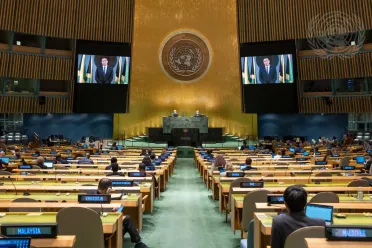Statement
Statement summary
ANDREW HOLNESS, Prime Minister of Jamaica, said the pandemic continues to exacerbate challenges, especially for small island developing States such as his, which already have limited resources. Sharing vaccines in a strategic manner serves the global common good, as no country will be safe until all are safe, he stressed, welcoming support received from bilateral and international partners and through the COVAX Facility. However, the latter “has not met expectations, as its noble ideals have been displaced by nationalistic endeavours”. He called for urgent, increased international cooperation to avoid further widening the recovery gap across countries and regions.
Turning to the digital divide, he said addressing the pandemic’s consequences will require greater engagement of the public and private sectors in building the foundations for long term development. Jamaica is taking an inclusive approach to improve digital literacy, including through a 50 per cent increase in access to information and communications technology (ICT) in schools over the next four years. Countries should be supported in their efforts to build robust and resilient digital infrastructure, as public investments of that sort can serve as a force multiplier to narrow gaps and inequality. In that context, he advocated for a bolstered digital alliance at the international level and expressed his support for the Secretary-General’s High-Level Panel on the Roadmap for Digital Cooperation.
Noting that Jamaica anticipates real GDP recovery within four years, he stressed that the country will require adequate fiscal space and funding to achieve the Sustainable Development Goals and to respond and recover from the health, social and economic implications of the pandemic. That is particularly true in light of high debt-servicing requirements. “The continued use of measures of development which do not take into account the full spectrum of vulnerabilities of small island developing States is a major impediment to our efforts to attain the [Goals],” he emphasized, pointing out that island States in the Caribbean are located in one of the most disaster-prone regions of the world and are therefore more vulnerable than income data suggest. Consideration of such States’ developmental level must be linked to their socioeconomic and environmental vulnerabilities.
In a similar vein, he called for a revision of the graduation criteria for least-developed, developing and middle-income States, “as the classification system utilized by international financial institutions is simply not appropriate”. “Graduation must be a reward, not a punishment,” he stressed, echoing sentiments previously expressed by the Secretary-General. Jamaica also seeks the reorientation of the international financial system to align financing with sustainable development. Noting that climate change continues to compromise the achievement of the Sustainable Development Goals in many countries, he pointed out that small island developing States have been largely unable to access climate finance at the pace and scale necessary to meet the challenges they face. He joined other small island developing States in calling for delivery of the $100 billion per year committed in 2015 by the international donor community.
Full statement
Read the full statement, in PDF format.
Photo

Previous sessions
Access the statements from previous sessions.
